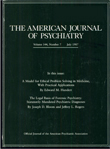Clinical Neurology for Psychiatrists, 4th ed.
This is the fourth edition of a successful book that teaches psychiatrists neurology and neurological wisdom. With the three previous editions, David Kaufman has been of great help to physicians preparing for the examination of the American Board of Psychiatry and Neurology. This latest edition is ready to achieve the same goal and meet the challenges of an increasingly demanding examination.
The book, which in its previous editions has enjoyed considerable success in countries such as Canada, Japan, and Italy, has been rewritten to include advances in etiology, diagnosis, and therapy. Among the many new aspects of neurology covered in the book are muscle diseases and molecular genetics, sleep disorders, pediatric neurology, recently described diseases (AIDS dementia, Lyme disease, chronic fatigue syndrome), and head trauma. The discussions of treatment for epilepsy, headaches, dementia, impotence, pain, and focal dystonias have been updated. Questions and answers follow every chapter. Some 370 questions are also found at the end of the book for an overall review. These questions are both an integral part of the book and a very useful tool for an active learning experience. The division in chapters on major neurological symptoms or syndromes provides an easy consultation source for clinicians beyond the preparation for the board examination. The references, updated and including mainly recent and classic articles and topic reviews, encourage further reading.
Kaufman teaches neurology in a simple but not simplifying way in this monograph. Increasing the already generous reliance on iconography found in the previous editions, Kaufman conveys the amount of knowledge of neuroanatomy necessary to the localization approach to neurological diseases. The chapter on psychogenic neurological deficits, for instance, relies on that knowledge but calls the reader's attention to several potentially misleading findings a clinician needs to consider before making a final decision about etiology. All of the topics—particularly seizures, head trauma, and movement disorders—are treated in a concise but exhaustive fashion.
In the best tradition of medicine, Clinical Neurology for Psychiatrists considers clinical and anatomical reasoning the first step in the approach to the patient. This first step is necessary to guide prescription of the appropriate neuroradio~graphic or laboratory testing. In this day and age, the chapter on neuroimaging provides good advice on the appropriate use of such expensive resources as computerized tomography, magnetic resonance scans, and single photon and positron emission tomography.
Appropriate weight is given throughout the book to the psychiatric manifestations of neurological diseases, such as depression in patients with epilepsy and stroke. Therefore, clinicians learning about neurology are consistently made aware that neurological diseases are often a source of psychiatric difficulties and that psychiatric disorders can mimic neurological diseases. Achieving this integrated knowledge is key for modern neuropsychiatric practice.



